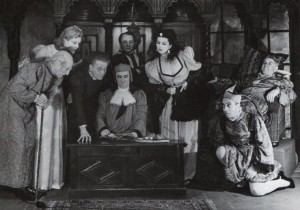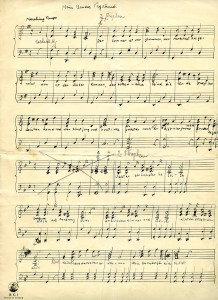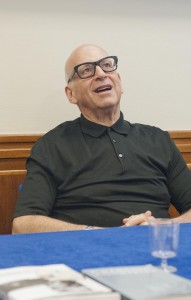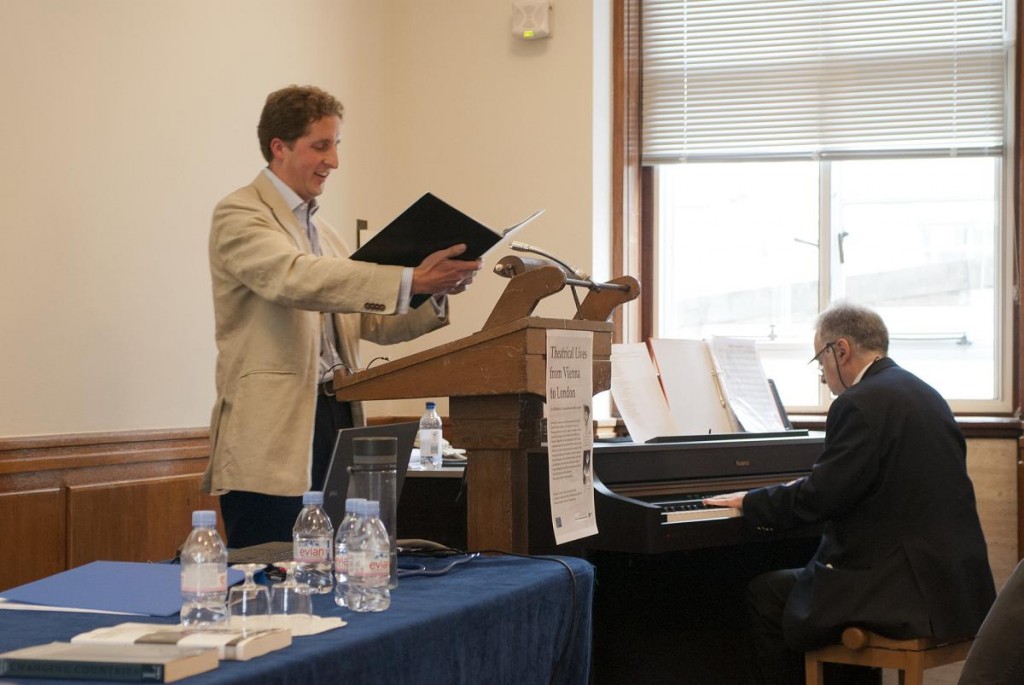
Over the past few weeks we brought you guest blog posts by the members of the Institute for Germanic & Romance Studies (IGRS), who have been working on the exhibition ‘Theatrical Lives from Vienna to London: Treasures from the Miller Archive’.
While the IGRS is known for its seminars, lectures, workshops, colloquia, conferences and fellowships programmes, it is, as few might know, also custodian of immensely insightful archives. The Miller Archive, the focus of the current exhibition, was deposited at the IGRS after Hannah Norbert-Miller’s death in 1998 and, with generous funding from the Miller Trust, is currently being sorted and catalogued by Dr Clare George. Some of the items can be viewed at the exhibition, as well as our official Flickr page here.
In order to introduce the fantastic Miller Archive to interested researchers (or refugees), the IGRS organised an exhibition launch event to take place at Senate House last week.
Dr Marian Malet from the Research Centre for German and Austrian Exile Studies (EXILE) opened the event by looking back on the history of the project. Marian got to know Hannah Norbert-Miller in the 1990s while working on an oral history research study based on a series of interviews of representative men and women who came to Britain from Germany, Austria and Czechoslovakia as refugees from Nazism. The findings have been published in Changing Countries: The Experience and Achievement of German-speaking Exiles from Hitler in Britain, 1933 to Today and include interviews with Hannah Norbert-Miller.
Lead archivist, Dr Clare George, gave a presentation on the contents of the Miller Archive, discussing some themes that have emerged while she has been working on the collection and exhibition. In Clare’s opinion, the archive will be a fantastic resource for exile study researchers. It offers fascinating insight into the individual lives of the Miller family, the wider refugee and exile theatre culture in wartime London, and the pre-WW2 culture in Central Europe (in particular Austria’s political cabaret theatre, which is represented in the archive through the scripts of Jura Soyfer).

After these two talks, the focus remained on Jura Soyfer. We listened to two live performances by Ken Eames and Malcolm Miller of songs written by the Austrian political journalist and cabaret writer, who died at the Buchenwald concentration camp in 1939. The songs, taken from Jura’s play ‘Astoria’, were successfully being kept alive through the adaptations by the composers Jimmy Berg and Marcel Rubin.
Prof Charmian Brinson (Director of Language Studies and coordinator of German at Imperial College London) gave a presentation on Hannah and Martin Miller’s life in London, playing the original recording of Martin Miller’s Hitler parody, which was broadcast on BBC German Service Radio on the 1st of April 1940. We also listened to the ‘Silvesterlied’ from Miller’s Revue of 1942, and watched clips from the 1960 film Exodus that features Hannah and Martin Miller, Paul Newman and Sal Mineo.
In addition to the opening of the Theatrical Lives exhibition, the event also marked the launch of the newest yearbook of the Research Centre for German and Austrian Exile Studies: German-speaking Exiles in the Performing Arts in Britain after 1933. Editor Prof Richard Dove introduced the contents of the book, which includes essays on Martin Miller, as well as the actor Gerhard Hinze and the cameraman Wolf Suschitzky.
 The event ended with a Q&A session with Daniel Miller, the son of Hannah and Martin Miller and owner of the Miller Trust. Daniel shared his memories of his parents (the sound of Martin Miller’s voice resonates most of all), the shows and films he has seen his parents in (including a family trip to Israel for the filming of Exodus), and his acquaintance with family friend Richard Attenborough (who played together with Martin Miller in the first 1,000 performances of The Mousetrap.)
The event ended with a Q&A session with Daniel Miller, the son of Hannah and Martin Miller and owner of the Miller Trust. Daniel shared his memories of his parents (the sound of Martin Miller’s voice resonates most of all), the shows and films he has seen his parents in (including a family trip to Israel for the filming of Exodus), and his acquaintance with family friend Richard Attenborough (who played together with Martin Miller in the first 1,000 performances of The Mousetrap.)
The event not only gave insights into the wealth of the Miller Archive, but also offered an opportunity to network with fellow researchers of exile studies and the descendants of refugee artists.
We are hoping to organise a similar event this autumn but until then come down to Senate House and visit the exhibition.
Exhibition details:
Further details and a fascinating insights into project archivist Clare George’s work on the archive can be found here.
The first blog post about the project (by Dr Christopher Barenberg) can be found here.
The exhibition runs at Senate House from Wednesday, 19 June 2013 to coincide with Refugee Week (17-23 June), until Friday, 30 August 2013. Admission is free. Opening hours: Monday to Saturday, 9:00 to 18:00.

